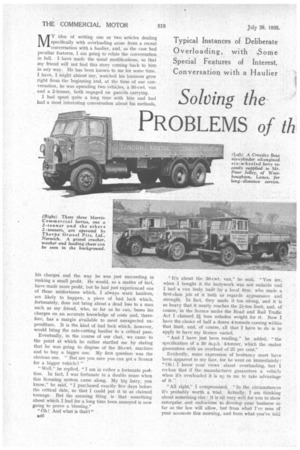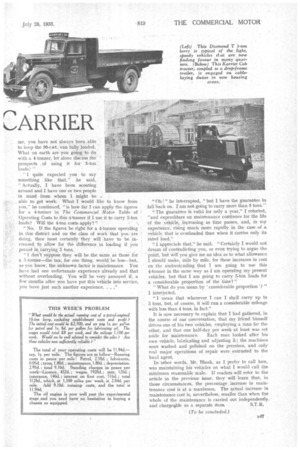Solving the
Page 64

Page 65

If you've noticed an error in this article please click here to report it so we can fix it.
PROBLEMS of th
CARRIER
MY idea of writing one or two articles dealing specifically with overloading arose from a recent conversation with a haulier, and, as the case had peculiar features, I am going to relate the conversation in full. I have made the usual modifications, so that my friend will not find this story coming back to him in any way. He has been known to me for some time. I have, I might almost say,. watched his business grow right from the beginning and, at the time of our conversation, he was operating two vehicles, a 30-cwt. van and a 2-tonner, both engaged on parcels carrying.
I had spent quite a long time with him and had had a most interesting conversation about his methods,
his charges and the way he was just succeeding in making a small profit. He Would, as a matter of fact, have made more profit, but he had just experienced one of those misfortunes which, I always warn hauliers, are likely to happen, a piece of bad luck which, fortunately, does not bring about a dead loss to a man such as my friend, who, so far as he can, bases his charges on an accurate knowledge of costs and, therefore, has a margin available to meet unexpected expenditure. It is the kind of bad luck which, however, would bring the rate-cutting haulier to a critical pass.
Eventually, in the course of our chat, we came to the point at which he rather startled me by stating that he was going to dispose of the 30-cwt. machine and to buy a bigger one. My first question was the obvious one. "But are you sure you can get a licence for a bigger vehicle? "
"Well," he replied, "I am in rather a fortunate position. In fact, I was fortunate in a double sense when this licensing system came along. My big lorry, you know," he said, "I purchased exactly five days before the critical date, so that I could put it in as claimed tonnage. But the amusing thing is that• something about which I had for a long time been annoyed is now going to prove a blessing."
"Oh! And what is that?"
ri46
"It's about the 30-cwt. van," he said. "You see, when I bought it the bodywork was not suitable and I had a van body built by a local firm, who made a first-class job of it both as regards appearance and strength, In fact, they made it too strong, and it is so heavy that it nearly reaches the 2i-ton limit, and, of course, in the licence under the Road and Rail Traffic Act I claimed 21 tons unladen weight for it. Now I have the choice of half a dozen 4-tonners coming within that limit, and, of course, all that I have to do is to apply to have my licence varied.
"And I have just been reading," he added, "the specification of a 30 m.p.h. 4-thriller, which the maker guarantees with an overload of 25 per cent."
Evidently, some expression of hesitancy must have been apparent in my face, for he went on immediately "Oh!. know your views about overloading, but I reckon that if the manufacturer guarantees a vehicle when it's overloaded it is up to me to take advantage of it."
"All right," I compromised. "In the circumstances it's probably worth a trial. . Actually, I am thinking about something else : it is all very well for you to show enterprise and endeavour to develop your buginess so far as the law will allow, but from what I've seen of your accounts this morning, and from what you've told
me, you have not always been able to keep the 30-cwt. van fully loaded. What on earth are you going. to do with a 4-tonner, let alone discuss the prospects .. of using it for 5-ton loads? "
" I quite expected you to say something like that," he said.
"Actually. I have been scouting around and I have one or two people in mind from whom I might be able to get work. What I would like to know frOin you,he continued, "is how far I can apply the figures for a 4-tonner in The Commercial Motor Table of Operating Costs to.. this 4-tonner if I use it to carry 5-ton loads? Will the 4-ton costs apply?" ' • "No. If .the figures be right fcir a 4-tonner operating in thisdistrict and on the class of mirk that you are doing, then most certainly they will :have to be. increased. to allow for the difference in loading if You persist in carrying 5 tons.
. "I don't suppose they will IX the same as those for a 5-tanner—the tax, for one thing,would. be less—but, as you know, the unknown fact6r is maintenance. You have had one unfortunate experience already and that without overloading. You will he very annoyed if, a few months after you have put this vehicle into service, you have .just such another -experience. . . ."
"Oh!" he interrupted, " but I have the guarantee to fall back on. I am not going to carry more than 5 tons." " The guarantee is valid for only a year," I retorted,
"and expenditure .on maintenance continues for the life Of the vehicle, increasing as tune passes, and in my
experience, rising much more rapidly in the case of a vehicle that is overloaded than when it carries only its rated load."
I appreciate that," he said. "Certainly I would not dream of contradicting you, or even trying to argue the
point, but will you give me an idea as to what allowance I should make, mile by mile, for these increases in cost on the unders6nding that I am going to use this
4-tonner in the same way as I am operating my present vehicles, but that I am going to carry 5-ton loads for a considerable proportion of the time?"
"What do you mean by considerable proportion ' ? " I interjected.
"1 mean that whenever I can I shall carry up to 5 tons, but, of course, it will run a considerable mileage with less than 4 tons, in fact."
It is now necessary to explain that I had gathered, in the course of our conversation, that my friend himself
drives one of his two vehicles, employing a man for the other, and that one half-day per week at least was set aside for maintenance. Each man looked after his own vehicle, lubricating and adjusting it: the machines were washed and polished on the premises, and only real major operations of repair were entrusted to the local agent.
In Other words, Mr. Blank, as I prefer to call him, was maintaining his vehicles on what I would call the
minimum reasonable scale. If readers will refer to the article in the previous issue, they will learn that, in those circumstances, the percentage increase in main tenance cost is at a maximum. The actual increase in maintenance cost is, nevertheless, smaller than when the whole of the maintenance is carried out independently. and chargeable as a separate item..




































































































